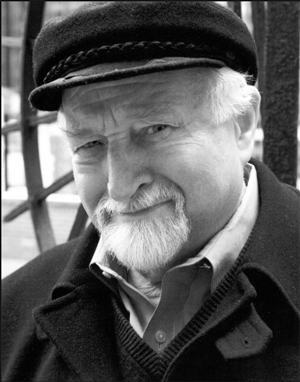By Jerry Tallmer
Love, sex, politics, betrayal, mothers, sons, fathers, daughters, deaths, double meanings, and surprise are never very far apart in the plays of Mario Fratti, none of which show any signs of his senior-senior citizenship.
Take a script like “Terrorist,” which through internal evidence — references to googling and to Guantánamo — was written quite recently. It mixes sex, literature, and looming torture in a broth not generally associated with affable greybeards, and ends, not with a double- but a triple-whammy that outdoes O. Henry at his whammiest.
Nor does Fratti show any signs of slowing down. Couple of years ago he guessed his output — those being performed around the world — to be some 40 works, long and short. Last year I asked him how many he’d written in all. “Oh my God, I don’t know,” he said. “Probably 81. Sometimes I’m embarrassed at how many.” Last week I asked him again. With a laugh: “I was finally forced to count them. It’s 91 — two-thirds one-act plays, one-third full length.”
Twenty-eight of those one-acts — including “Terrorist” — have just been brought out by the New York Theatre Experience as a 342-page $20 paperback titled “Unpredictable Plays.” On July 21 its publication was celebrated at the Drama Book Shop on West 40th Street, with Fratti reading from his “Suicide Club.”
Two weeks and two days before that, Mario Fratti — a New Yorker since 1963 — was back in the town of his boyhood, l’Aquila, Italy, being honored on his 80th birthday.
“So few people I recognized,” he said now. “The ceremony was in the City Hall, in front of these huge great paintings by Teofilo Patini [1840-1906], our [l’Aquila’s] greatest painter, an artist like Mondrian, but never recognized, so at 50 he started drinking and at 60 [actually 66] committed suicide.
“I feel guilty, standing there with the television going, in front of these great paintings. And then, oh my God, an old gentleman comes over and hands me a photograph and says: ‘Do you remember me?’
“ ‘No,’ I say, and he points to the photograph, and my God, it is my class in school in l’Aquila in 1934, when I am 7 years old and so is he, and his name is Umberto Cialenti and he is the father of the present mayor, Massimo Cialenti, and we are the only two left in our class.”
Fratti placess the photo in this journalist’s hands. It is a large photo, 16 inches, of some 50 or 60 youngsters in Mussolini-era caps and uniforms — “the balilla, named for boys who kicked the Austrians out of Italy by throwing stones at them, and I am here [lower left corner] and Massimo is here [upper right corner] and this man in the center [in a crisp white suit] is our teacher, a Fascist.”
Yes, Mussolini came to l’Avilla once or twice when Mario was a kid. “And whenever that happened, my father, a good union man, was put in jail for a couple of days.”
The 1934 photo was 13 years before Mario Fratti left l’Aquila to go to the university in Venice for his Ph.D. in Literature and Language, and 26 years before newspaperman Fratti watched enough of Federico Fellini at work and non-work on “8” to write a play that would one day provide the core of Broadway’s “Nine,” and 29 years before Off-Broadway’s Lucille Lortel invited Mario to come over for her productions of his plays “The Academy” (about gigolos in Venice) and “The Return” (about Auschwitz), both of which are among the 28 texts in the new paperback.
“At that thing at the City Hall,” says Mario, “four Italian generals were forced to attend. You should have seen their rigid faces. I talked about love, not war. One general melted and came and talked to me about soldiers being guardians of the peace. ‘In Iraq,’ he said [Italy had had a small corps of troops in Iraq], ‘we gave the people cell phones.’ I said: ‘First you kill their fathers and then you give them cell phones.’ ”
A drama critic himself for two publications, one in America, one in Italy, Fratti can be seen four or five nights a week at theater, sometimes accompanied by his director daughter, Valentina. (He lost his wife, her mother, in 1992). If he has nothing positive to say about a show, he says nothing. Playwriting is hard enough, he knows.
“I think my luck comes from being non-avant-garde,” Fratti says. “Someone accused me of being ‘conservative and traditional like Arthur Miller.’ I consider that a complement. My aim in writing is clarity — being clear. And easily translatable — that’s important too. My language” — he writes everything in English — “is rather telegraphic.
Like Pirandello?
“No, no.” Drama critic Fratti waggles a finger at me. “Pirandello” — playwright Fratti’s deity — “was an intellectual whose sentences were very, very long. He can only be translated successfully when each of his sentences is broken into 10 sentences. You know, nobody knows what makes a playwright. Some great novelists — Günter Grass and Alberto Moravia — tried writing plays, and it didn’t work.”
Henry James too.
“Yes. My question: Why do men betray? Why do women betray? I go into interesting visions. Last month I was asked to write a play about Garibaldi [soldier, patriot, unifier of Italy; 1807-1882]. Could be a huge epic — but I don’t want to do that. Know what I did? I sent a woman to interview him. All he wants to talk about is war. All she wants to talk about is sex.”
Save me a couple of seats, Mario.






































